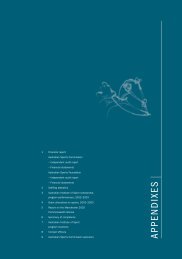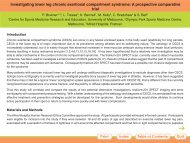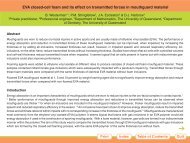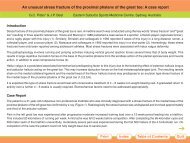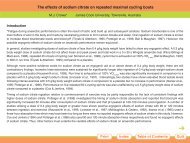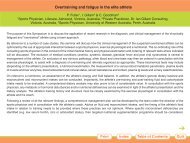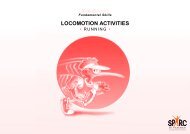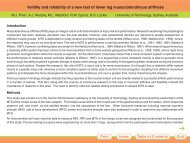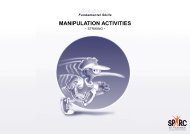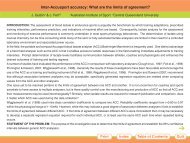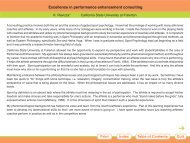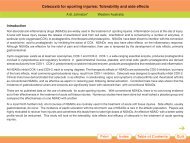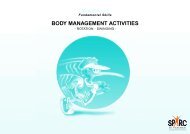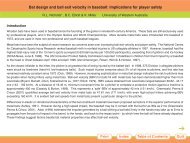2002-03 Annual R eport 2002-03 Annual R eport - Australian Sports ...
2002-03 Annual R eport 2002-03 Annual R eport - Australian Sports ...
2002-03 Annual R eport 2002-03 Annual R eport - Australian Sports ...
You also want an ePaper? Increase the reach of your titles
YUMPU automatically turns print PDFs into web optimized ePapers that Google loves.
Back, left to right: Errol Alcott (Physiotherapist), Jock Campbell (Physical Performance Manager), Jimmy Maher, Bradley Hogg, Mike Young (Specialist Throwing Coach), Tim<br />
Nielsen (Assistant Coach/Performance Analyst).<br />
Middle, left to right: Darren Lehmann, Andrew Symonds, Andrew Bichel, Jason Gillespie, Matthew Hayden, Brett Lee, Ian Harvey, Lucy Frostick (Team Massage Therapist).<br />
Front, left to right: Damien Martyn, Glenn McGrath, Ricky Ponting (Captain), John Buchanan (Coach), Adam Gilchrist (Vice-captain), Stephen Bernard (Team Manager), Shane<br />
Warne, Michael Bevan.<br />
ICC CRICKET WORLD CUP IN<br />
SOUTHERN AFRICA, 20<strong>03</strong><br />
Australia became the first side to win the World Cup for the third<br />
time when it swept aside its opponents in the final, India, by 125<br />
runs at The Wanderers, Johannesburg on 23 March 20<strong>03</strong>.<br />
That match will rightly be remembered in large measure for the<br />
magnificent innings of captain Ricky Ponting, who set up the win<br />
with a brilliant, unbeaten 140 that helped his side to 2-359, a new<br />
record total for Australia in one-day international cricket.<br />
However, the final was just the last act of a remarkable effort by<br />
the whole squad as it went unbeaten throughout the whole<br />
tournament, a feat not achieved since the West Indies did it in<br />
1979 when it played just five matches (one of which was washed<br />
out) to lift the Cup. Australia’s 11 successive wins, together with<br />
six more victories that finished the VB Series, gave it a new world<br />
record of 17 straight victories, a mark the players would extend to<br />
21 in the Caribbean.<br />
That statistic alone reveals Australia’s consistent excellence,<br />
but what it does not show is that the World Cup triumph was<br />
achieved despite a series of problems that may well have<br />
unhinged lesser sides.<br />
After losing promising young all-rounder Shane Watson to a back<br />
injury before the tour party even left for South Africa, the squad<br />
then had to cope with the loss of star leg-spinner Shane Warne,<br />
Australia’s leading one-day wicket-taker, on the eve of its first<br />
match against Pakistan.<br />
Warne had tested positive for a banned substance during the<br />
VB Series and returned home to address the situation. He was<br />
eventually banned from all cricket for 12 months.<br />
Despite those issues, and continued speculation about whether<br />
Australia would play in Zimbabwe, Ponting’s men got off to a<br />
flying start only to lose another key member of the attack, Jason<br />
Gillespie, to a heel injury after four matches.<br />
Amazingly, however, Australia barely missed a beat throughout<br />
the tournament and whenever the side was threatened someone<br />
emerged to play a key role that saw it home.<br />
79<br />
Two players who emerged to play major parts in the side’s<br />
success were the Queensland duo of Andrew Symonds and<br />
Andrew Bichel. Symonds’ selection in the final squad appeared<br />
questionable after years of underachievement but, when it<br />
mattered most, he finally came of age with 326 runs, a handy mix<br />
of spin and seam, and some brilliant fielding. Symonds played<br />
two crucial innings that helped shape the side’s progress: an<br />
unbeaten 143 in the opening match against Pakistan in<br />
Johannesburg to lead a recovery from 4-86 to 8-310, and then 91<br />
not out in testing conditions in the semi-final against Sri Lanka in<br />
Port Elizabeth.<br />
Bichel began the tournament as a fringe player, but Gillespie’s<br />
injury handed him his chance and he took it so spectacularly that<br />
by the end of the tournament his name was on most<br />
commentators’ lips as a key figure in Australia’s success. He took<br />
16 wickets, including 7-20 against England in Port Elizabeth, the<br />
second best World Cup figures of all time, and although he batted<br />
only three times each contribution he made was vital. His first, an<br />
unbeaten 34, helped haul Australia back from 8-135 to beat<br />
England’s 8-204. His second was 64, a maiden one-day fifty, that<br />
helped his side recover from 7-84 against New Zealand. Thirdly<br />
his unbeaten 19 against Sri Lanka helped Symonds add a<br />
priceless 37 for the eighth wicket in the semi-final. Bichel even<br />
excelled in the field with his brilliant pick-up and throw to run out<br />
Aravinda de Silva in that semi-final, the moment when Australia<br />
really sealed victory.<br />
Bichel and Symonds may have been the most visible rising stars<br />
by the end of the tournament, but there were plenty of other<br />
established stars for Australia. Chief among them was Brett Lee,<br />
who continued his spectacular form from the second half of the<br />
VB Series by claiming 22 wickets in the tournament, a mark<br />
beaten only by Sri Lanka’s Chaminda Vaas. Lee claimed<br />
Australia’s first hat-trick in World Cup history, against Kenya.<br />
He devastated New Zealand with 5-42 and his opening spell in<br />
the semi-final against Sri Lanka was a key factor in allowing<br />
Australia to defend a modest total with genuine comfort.<br />
I nternational Cricket Council Cricket World Cup in Southern Africa, 20<strong>03</strong>



